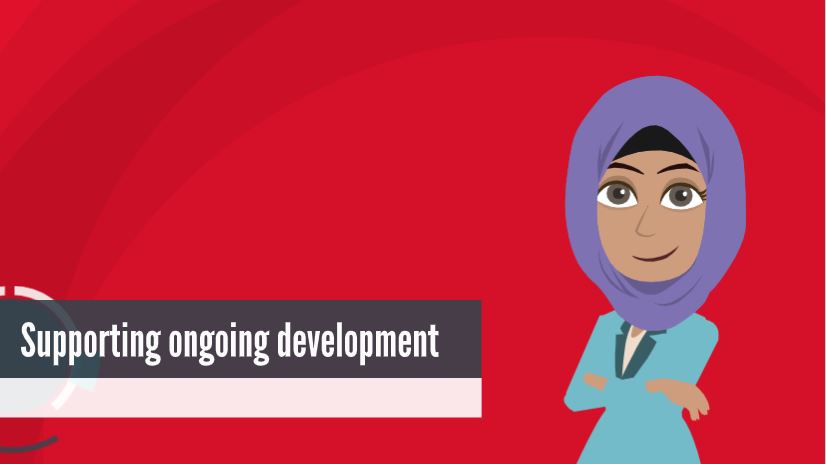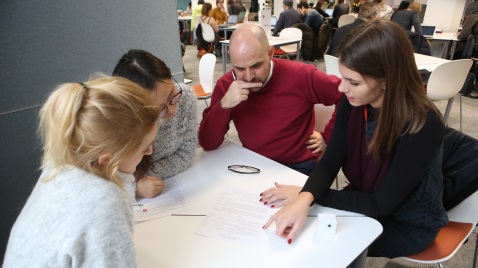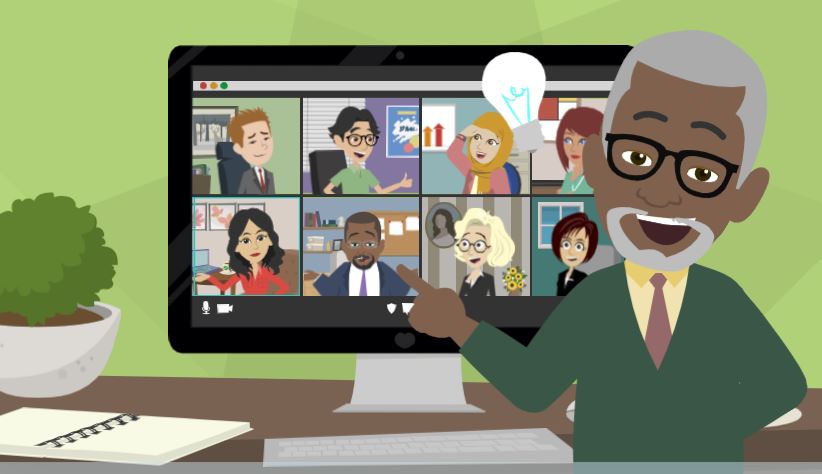Learning is more than just going on a course: ways you can support your team with their learning
 Ongoing development
Click on the video above to find out more about how you can support the development of your team. Captions are enabled.
Ongoing development
Click on the video above to find out more about how you can support the development of your team. Captions are enabled.
On-the-job and social learning
 Stretch assignments and delegation
Stretch assignments and delegation
A stretch assignment is a task that is not part of your role but is relevant and adjacent to your role. For example, maybe you have written a report that your manager will take to a group of senior stakeholders. In this situation you could present the report to the group yourself to gain experience of presenting to senior stakeholders. Stretch assignments do not have to be complicated, it can be as simple as chairing a team meeting to get experience of something you have never done before. The important thing is to get feedback on your performance on the stretch assignment to consolidate your learning, that way you are getting both on the job and social learning. If you want to know more about stretch assignments check out this video.
As a manager, think about where you can be using stretch assignments to both develop and engage/empower your team. Simple things like a rotating chair at team meetings, or asking someone to pick up a presentation you would normally do can be very valid stretch assignments and very valuable learning experiences.
An important tool for managers with stretch assignments is delegation. What can you delegate to members of your team that will stretch and develop them? There are a couple of important points to consider here, firstly stretch assignments should do exactly that, stretch, not break. It is important that the tasks given are achievable by the person they are given to. They should have the right level of difficulty to provide development and be achievable rather than being out of the reach of the person and ultimately demotivating due to failure.
Another thing to think about is why and when you delegate. You can delegate to someone because they:
- Have the skills to do the task
- Will enjoy doing the task
- Will develop and grow by doing the task
Delegation should be supported and, especially if developmental, happen in a safe and supportive environment where there is room for questions and feedback. To read more about effective and empowering delegation search for delegation on the MyStaffDevelopment platform.
To think about how you can use coaching conversations to explore development options, check out this guide.
Shadowing
 A quick guide to job shadowing
Click on the video above to find out more about how you can set up job shadowing schemes for development. Captions are enabled.
A quick guide to job shadowing
Click on the video above to find out more about how you can set up job shadowing schemes for development. Captions are enabled.
Self-reflection

Self-reflection is an aid to developing your skills and reviewing their effectiveness, it stops you doing things as you have always done them and helps you question yourself about where you can make improvements and how you can be more effective. It is about questioning, in a positive way, what you do and why you do it and then deciding whether there is a better, or more efficient, way of doing it in the future.
This might sound obvious, but when was the last time you took a step back from your work and asked yourself, what could I do differently here or what did I learn from doing this? Self-reflection is an important part of learning, but we need to actively make the time to do it, get your team in the habit of doing it and combining it with feedback from others.
Feedback
Feedback is a useful part of the learning and development process as it can give you insights into your skills, knowledge, strengths and behaviours that you otherwise might not have access to.
Feedback can give you the opportunity to make changes to your ways or working quickly and effectively if you need to. People are often happy to provide feedback because they know that it can directly impact their own experience, creating a mutually beneficial “win-win” scenario.
Think about how you will go about getting feedback and from whom, what questions will you ask, and what are you trying to learn?
The most valuable feedback often comes from a range of stakeholders who meet you and your work in different ways and contexts. Think about targeting the feedback to meet the specific area you want to develop and get feedback on what you do well and what you could improve. A template feedback form is available here: Feedback-form.doc (live.com), however the best feedback is often given anonymously so you may want to think about setting up a survey in our Teams and Leadership tool. Feedback can also be a really valuable part of the CDR process.
Mentoring
Mentoring is one person sharing their knowledge, skills and experience to assist others to progress in their careers. Mentors are prepared to offer help as the need arises - within agreed bounds. Mentoring is rather more than ‘giving advice’, or passing on what your experience was in a particular area or situation.
It's about motivating and empowering the other person to identify their own issues and goals and helping them to find ways of resolving or reaching them - not by doing it for them, or expecting them to ‘do it the way I did it’, but by understanding and respecting different ways of working.
It might be that there are clear opportunities for mentoring within your team or part pf the School, but you can also find out more about our formal mentoring offer.
You may also wnat to find out more about our whole PSS career development offer.
Formal learning
 Courses and workshops
Courses and workshops
Courses and workshops that we are running internally can be found on the MyStaffDevelopment platform . Formal learning items should be chosen for their relevance and not for their availability. We also have a range of online learning that can be accessed on the same platform.
It is important to think about how the formal learning your staff do links to their on-the-job and social learning. As we said earlier, just attending a training course or workshop isn’t going to change much if they have no opportunity to put the learning into practice.
Think about ways you support your team embed their formal learning. For example, presenting back their learning in a team meeting or development session is a good way to share their learning with others, remind themselves of the content and potentially practise new skills such as presenting or chairing.
Think about how you will measure the success of what they have learnt, will they get feedback from colleagues about how their new skills have developed over time? Will you help them combine their formal learning with shadowing or stretch opportunities for example?
Whatever you do do, make sure that the sum total of their learning during the next CDR cycle is not just attending a course.
If you would like the opportunity to run a full, anonymous diagnostic report on the way you work together as a team to support in identifying development needs, please let us know at hr.learning@lse.ac.uk and we can get you set up with an online tool to do this.
Teams & Leadership is an online tool offered by Organisational Learning that helps teams work better together, and leaders to improve. The tool is for managers, leaders and teams to conduct anonymous 360 degree feedback, get a personalised, downloadable report and support with learning materials around areas highlighted for development.
Find out more here.